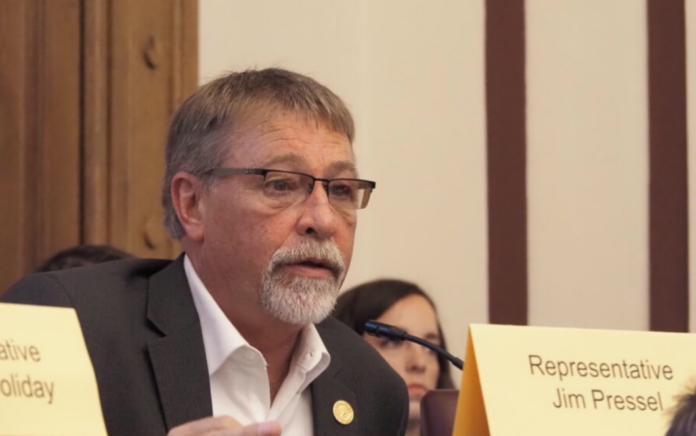
By Leslie Bonilla Muñiz
Indiana Capital Chronicle
INDIDNAPOLIS — Indiana’s road funding money comes largely from motor fuel taxes, and with that revenue expected to drop, lawmakers and transportation experts convened Thursday to figure out how to finance the state’s future infrastructure needs.
The Indiana General Assembly slipped a three-year extension of an annual 1-cent tax hike into the state budget this year, but it’s a stopgap during the hunt for a longer-term solution.
The Indiana Department of Transportation (INDOT) manages 29,800 lane miles of roadway and nearly 6,000 bridges. Of its state funding, 82% comes from fuel taxes. Local units of government cover an additional 190,000 lane miles and 13,000 bridges.
As more Hoosiers buy electric vehicles or more fuel-efficient gas-guzzlers, state leaders are expecting less in the bank — but it’s unclear how much.
“You could ask 80 different people for a forecast and they would get back to you with probably 82 different answers,” INDOT Chief Financial Officer Joe Gustin told the Funding Indiana’s Roads for A Stronger Safer Tomorrow Task Force on Thursday.
INDOT projects that around the year 2038, about half of Indiana’s registered vehicles will be electric — meaning a “billion-plus” loss in state revenues and drops in local revenues too, Gustin said.
Fuel consumption is expected to begin a long-term decline starting in 2025, according to Build Indiana Council Executive Director Brian Gould. His organization represents road and bridge builders.
And while plug-in electric vehicles use no gasoline and hybrid versions use little, even owners of traditional gas-powered vehicles are likely to need less gasoline in the future — and will therefore pay less in taxes.
That’s because federal fuel efficiency standards set how far automakers must ensure their products can go per gallon of gasoline. And the National Highway Safety Transportation Administration is working on stricter standards for cars and pickup trucks made 2027–2032, and heavy-duty vehicles 2030-2035.
Gould said that update is expected to result in a 4%-5% reduction in gasoline consumption annually.
“So I will tell you: there is an Achilles heel with our infrastructure plan that we have in Indiana. It’s that … as we put more money into the system, it definitely became more reliable on the consumption of gasoline,” Gould continued.
He said that reliance could “force our hand” in the next 5-10 years when it comes to road funding.
Some states have experimented with shifts from gasoline-based taxes to taxing based on vehicle miles traveled, but some witnesses pointed out concerns about data reliability, and public willingness to even share that data.
Inflation has already swelled transportation project costs far above their original budgets.
Indiana Metropolitan Planning Organization (MPO) Council Deputy Director Pamela Drach said the organization had needed to borrow money recently from another MPO to cover the costs of a project ballooned by inflation.
Drach said the organization might have to start doing projects in phases, which she said is less cost-effective overall.
INDOT also bemoaned the impacts of inflation, citing triple digit inflation rates for some types of steel, gas, diesel and more.
Though Thursday’s meeting was a scene-setter, full of details on the status quo, the task force must put together a report with recommendations by January.
Rep. Jim Pressel, who chairs the House’s roads committee during the legislative session, said he wouldn’t expect action this legislative session, however, because it’s a short, non-budget one.
Although alternative fuels and fuel efficiency standards loomed large over the meeting, Pressel urged a measured approach.
“I think we’ve got a little bit of time to make sure we get this right,” he told reporters. “It’s coming. I just don’t think it’s going to happen tomorrow.
* * *
The Indiana Capital Chronicle is an independent, nonprofit news organization dedicated to giving Hoosiers a comprehensive look inside state government, policy and elections. The site combines daily coverage with in-depth scrutiny, political awareness and insightful commentary.
You can read the original version of the story here.




